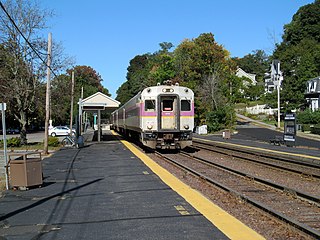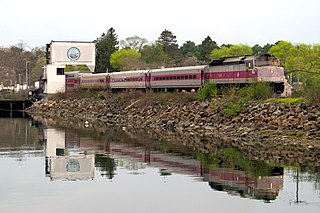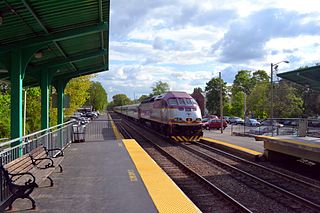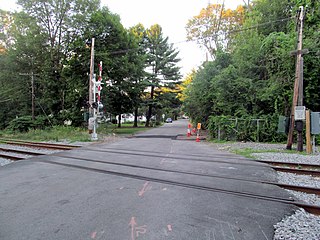
North Station is a commuter rail and intercity rail terminal station in Boston, Massachusetts. It is served by four MBTA Commuter Rail lines – the Fitchburg Line, Haverhill Line, Lowell Line, and Newburyport/Rockport Line – and the Amtrak Downeaster intercity service. The concourse is located under the TD Garden arena, with the platforms extending north towards drawbridges over the Charles River. The eponymous subway station, served by the Green Line and Orange Line, is connected to the concourse with an underground passageway.

The MBTA Commuter Rail system serves as the commuter rail arm of the Massachusetts Bay Transportation Authority's (MBTA's) transportation coverage of Greater Boston in the United States. Trains run over 394 mi (634 km) of track to 135 stations. It is operated under contract by Keolis, which took over operations on July 1, 2014, from the Massachusetts Bay Commuter Railroad Company (MBCR).

Oak Grove station is a Massachusetts Bay Transportation Authority (MBTA) intermodal transit station in the northern section of Malden, Massachusetts, just south of the Melrose border. It is the northern terminus of the rapid transit Orange Line and a stop on the Haverhill Line commuter rail service. The accessible station has a 788-space park and ride lot and is served by three MBTA bus routes.

Malden Center station is a Massachusetts Bay Transportation Authority (MBTA) intermodal transit station in Malden, Massachusetts. Located on an elevated grade above Pleasant Street in downtown Malden, it serves the rapid transit Orange Line and the MBTA Commuter Rail Haverhill Line. The station has one island platform for the two Orange Line tracks and a single side platform for the single commuter rail track. Two busways are used by 12 MBTA bus routes.

Community College station is a rapid transit station on the MBTA Orange Line in Boston, Massachusetts. It is located in the Charlestown neighborhood off Austin Street near New Rutherford Avenue (MA-99), under the double-decked elevated structure carrying Interstate 93 to the Zakim Bunker Hill Bridge. The station is named for the adjacent Bunker Hill Community College. The station opened in April 1975, replacing the City Square and Thompson Square stations of the Charlestown Elevated. It was made accessible around 2005.

The Haverhill Line is a branch of the MBTA Commuter Rail system, running north from downtown Boston, Massachusetts to Haverhill. The service operates on the Western Route of the former Boston and Maine Railroad, which extends north to Portland, Maine, though MBTA commuter rail service has not continued north of Massachusetts since 1967.

The Newburyport/Rockport Line is a branch of the MBTA Commuter Rail system, running northeast from downtown Boston, Massachusetts towards Cape Ann and the Merrimack Valley, serving the North Shore. The first leg, operating via the Eastern Route of the former Boston and Maine Railroad, serves Chelsea, Lynn, Swampscott, Salem, and Beverly. From there, a northern branch continues via the Eastern Route to serve Hamilton, Ipswich, Rowley, and Newburyport, while other trains operate east from Beverly via the Gloucester Branch, serving Manchester, Gloucester, and Rockport. A bicycle coach is offered on the Rockport branch during the summer. With over 11,000 daily riders in October 2022, the line is the second-busiest on the system.

Wyoming Hill station is an MBTA Commuter Rail station on the Haverhill Line, located in Wyoming Square near downtown Melrose, Massachusetts. The station has two low-level side platforms and is not accessible. Wyoming Hill, in addition to the two other commuter rail stops in Melrose, was originally intended to be an extension of the Orange Line further north to Reading, Massachusetts.

Silver Hill station is an MBTA Commuter Rail Fitchburg Line station in Weston, Massachusetts, United States. The station has a small shelter, parking area, and a gravel boarding area; it is not accessible. It was the least-used station in the entire MBTA system in 2018, with an average of just eleven daily boardings. Silver Hill station opened in 1844 as one of the original stops on the Fitchburg Railroad. The Boston and Maine Railroad unsuccessfully attempted to close the station in 1959. It remained in use until its temporary closure by the Massachusetts Bay Transportation Authority (MBTA) in December 2020 due to low ridership and a lack of accessibility, with indefinite closure effective April 2021. It reopened on November 18, 2024.

Melrose Highlands station is an MBTA Commuter Rail station on the Haverhill Line located in the Melrose Highlands neighborhood of Melrose, Massachusetts. It is the most used station in the city, and was originally planned to be a station on the cancelled extension of the Orange Line to Reading. The station is accessible.

West Medford station is an MBTA Commuter Rail station located at West Medford Square in Medford, Massachusetts. It is served by the Lowell Line. The station has low-level platforms and is not accessible; accessible mini-high platforms are under construction.

The Senator Patricia McGovern Transportation Center, also known as the McGovern Transportation Center or simply Lawrence station, is a transit station in Lawrence, Massachusetts. It serves the MBTA Commuter Rail Haverhill Line and Merrimack Valley Regional Transit Authority local bus service. The station, which opened in 2005, is the latest of seven distinct stations located in Lawrence since 1848; it is located in the city's Gateway District.

Bradford station is an MBTA Commuter Rail station in the Bradford neighborhood of Haverhill, Massachusetts, served by the Haverhill Line. The Haverhill Line's layover yard is located adjacent to the station. It is temporarily the northern terminal of the Haverhill Line until mid-2025.

Greenwood station is an MBTA Commuter Rail station on the Haverhill Line located in the Greenwood neighborhood of Wakefield, Massachusetts. The station consists of two side platforms serving the line's two tracks. The low-level platforms are not accessible.

Wakefield station is an MBTA Commuter Rail station in Wakefield, Massachusetts served by the Haverhill Line. The station has two side platforms, which are not accessible, serving the line's two tracks. The station building, constructed in 1889, was listed on the National Register of Historic Places in 1989 as Wakefield Upper Depot.

Reading station is an MBTA Commuter Rail station in Reading, Massachusetts. It serves the Haverhill/Reading Line. It is located at Lincoln and High Streets on the western fringe of Reading's central business district. The station's historic depot building was built in 1870 by the Boston and Maine Railroad. The station was the terminus of the line from 1959 until the re-extension to Haverhill station in 1979.

Prides Crossing station is a former MBTA Commuter Rail station on the Newburyport/Rockport Line, located in the village of Prides Crossing in Beverly, Massachusetts. It was opened by the Eastern Railroad as a flag stop in the mid-19th century. A stick style wooden station building was constructed around 1880 as wealthy residents built summer homes in the area. The Eastern Railroad was acquired in 1885 by the Boston and Maine Railroad (B&M), which operated commuter service to Prides Crossing until the Massachusetts Bay Transportation Authority (MBTA) took over in the 1970s. Prides Crossing was reduced to peak-hour-only service in 1981. It was temporarily closed in December 2020 because of low ridership and a lack of accessibility, with the closure becoming indefinite in April 2021. The former station building, not used by the railroad since the mid-20th century, is occupied by a private business.

Kendal Green station is an MBTA Commuter Rail station in Weston, Massachusetts, US, served by the Fitchburg Line. The station has a single platform serving two tracks; it is not accessible. It originally opened with the Fitchburg Railroad in 1844 as "Weston"; it was renamed Kendal Green after the green cloth around 1886. A new station building was constructed in 1896. Service passed to the Boston and Maine Railroad in 1900, and to the Massachusetts Bay Transportation Authority (MBTA) in the 1970s. The former station building, reused as a private residence, was added to the National Register of Historic Places in 2000 as a contributing property to the Kendal Green Historic District.

Hastings station was an MBTA Commuter Rail Fitchburg Line station in Weston, Massachusetts. The station had a small parking area but no platforms; passengers boarded trains from the Viles Street grade crossing. It was originally opened in the 1890s to serve the adjacent Hook & Hastings organ factory. The factory closed in 1935, but the station remained open with limited service. It was temporarily closed by the Massachusetts Bay Transportation Authority (MBTA) in December 2020 due to its low ridership and lack of accessibility; indefinite closure became effective in April 2021.





















